JACKIE BROWN
NOT JUST A THEATRE ORGANIST
-oOo-
JACKIE BROWN AT THE MOVIES
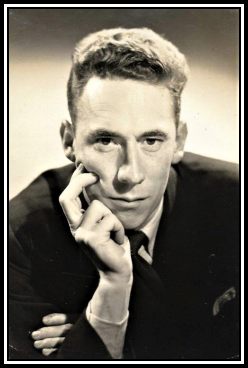 Jackie Brown
Jackie Brown
-oOo-
Throughout his professional career, Jackie composed and arranged music for a number of films. The films that he was associated with were all British B Films, however he did work with a number of artists that went on to have successful careers both in the U.K. and Hollywood including the actor, Jack Hawkins (1910-1973) and the director, Michael Winner (1935-2013).
-oOo-
At one time, going to the cinema meant seeing more than just one film. The Feature Film (A Film), which is the principle presentation that customers actually want to see when going to the cinema. was once supplemented with a Newsreel, Trailers for the following week’s attraction. an occasional Cartoon along with a second Feature Film, which was of shorter duration than the main film and starred lesser known actors or those of lesser appeal. These second Feature Films were often referred to as B-Films.
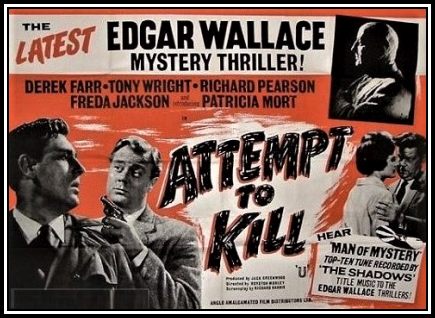 Poster for one of the many films based on the writings of the mystery writer, Edgar Wallace (1875-1932). A successful series of B-Films were made based on his writings. Together with the producer, Merian C. Cooper (1893-1975), he conceived the idea of King Kong, which was filmed in 1933.
Poster for one of the many films based on the writings of the mystery writer, Edgar Wallace (1875-1932). A successful series of B-Films were made based on his writings. Together with the producer, Merian C. Cooper (1893-1975), he conceived the idea of King Kong, which was filmed in 1933.
The B-Film was made on a lower budget and generally of shorter duration than an A-Film. The B-Film generally ran for about an hour or perhaps slightly more and was shown first in a programme. In contrast, the A-Film was made with a substantially larger budget, most often featured well-known actors and ran typically between 80 and 180 minutes in length.
Many independent films were made on low budgets, however films made on the mainstream circuit with inexperienced or unknown filmmakers could also have low budgets. A number of present day successful actors and directors began their film careers in such films.
Despite their low budgets and often somewhat poor production and acting, many of these B-Films proved to be immensely entertaining.
-oOo-
The first film that Jackie seems to have been involved in was Front Page Story made in 1953-1954. Here, he arranged and conducted the orchestra for the music, which was based on a theme by Michael Carr (1905-1968). The film was directed by Gordon Parry (1908-1981) and starred Jack Hawkins, Elizabeth Allan (1910-1990) and Eva Bartok (1927-1998) and follows the daily activities of a Fleet Street Newspaper Editor.
 The film is available for viewing on You Tube.
The film is available for viewing on You Tube.

-oOo-
Music heard playing as the credits roll
-oOo-
I recall seeing Front Page Story in 1954 at the Excelsior Kinema in Bethnal Green and seemed to remember that I found it interesting, unlike most reviewers of the time!
-oOo-

Between 1955 and 1961, Jackie composed the music and also provided part of the musical accompaniment to a number of films made for the E.J. Fancey Company New Realm.

E.J. Fancey was a film producer (E.J. Fancey Productions) and distributor (DUK) who specialised mainly in producing supporting films (i.e. B Films) and short subjects. Many of his productions were often edited from material that had appeared in earlier films produced by others. Perhaps his best known film was Down Among the Z Men (1952) with The Goons (Harry Secombe (1921-2001), Peter Sellers (1925-1980), Spike Milligan (1918-2002) and Michael Bentine (1922-1996)).

-oOo-
The first film that Jackie worked on for The Company was Shadow of a Man in 1955. This was a British crime film directed by Michael McCarthy (1917-1959) with a running time of sixty-six minutes. The film starred Paul Carpenter (1921-1964), Rona Anderson (1926-2013) and Jane Griffiths (1929-1975).

The plot of the film revolves around the death of a drunken man. The police investigate in order to learn if the death is the result of heart failure or murder?
Jackie composed and arranged the music used in the film and conducted the orchestra. He also appeared in the film seated and playing a piano in the nightclub scenes.
 Jackie at the piano in the nightclub scenes
Jackie at the piano in the nightclub scenes
Shadow of a Man is available to be seen on Prime Video and on DVD thanks to Renown Pictures.
-oOo-
Also in 1955, Jackie worked on the short film, Man on the Cliff, which was made by Pathescope, which was another E.J. Fancey Company and released by New Realm. The film had a running time of twenty-two minutes and followed the events of a man who regained consciousness on the edge of a cliff near Brighton. Fearing he was a missing scientist wanted by the police, he swops identity with a dead man he found at the bottom of the cliffs.
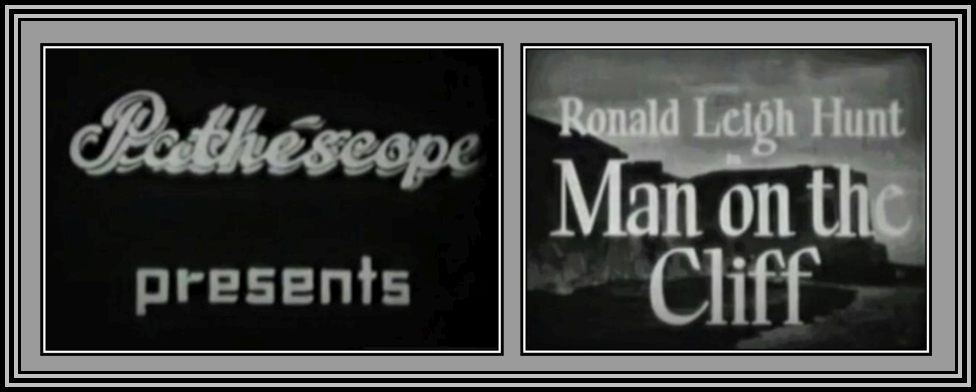
The cast included Ronald Leigh-Hunt (1920-2005), Russell Carr (1918-1998) and Adrienne Scott (1933-2013) and was directed by Robert Hartford-David (1923-1977) and with Jackie providing the music used in this film.

The film may be seen by clicking here.
-oOo-
In 1956, Jackie provided the music for another production for the E.J. Fancey Company entitled They Never Learn.
The film was a crime-thriller with a running time of forty-six minutes and was directed by Denis Kavanagh (1906-1984). The plot follows a policewoman who goes undercover to unmask a gang of forgers. She achieves her purpose by becoming a prisoner in Holloway Woman’s Prison and then a Gangster’s Moll. The film starred Adrienne Scott (1933-2013), Jackie Collins (1937-2015), John Blythe (1921-1993) and Graham Stark (1922-2013).
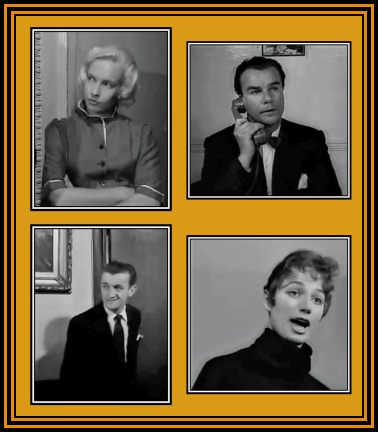 Top Left: Adrienne Scott; Top Right: John Blythe;
Top Left: Adrienne Scott; Top Right: John Blythe;
Bottom Left: Graham Stark; Bottom Right: Jackie Collins
-oOo-
Also in 1956, Jackie provided the music for the E.J. Fancey Company’s film, Fighting Mad, which had a running time of fifty-three minutes and was directed by Denis Kavanagh (1906-1984).

The film starred Joe Robinson (1927-2017), Adrienne Scott (1933-2013), Beckett Bould (1880-1970) and Jack Taylor (1936).
 Left: Joe Robinson; Centre: Beckett Bould; Right: Jack Taylor
Left: Joe Robinson; Centre: Beckett Bould; Right: Jack Taylor
Music heard at the start of the film while the credits were shown
The plot of the film involved a boxer who retired to Canada after accidentally killing two of his opponents and where he becomes involved with two crooked lumbermen attempting to evict a landowner.
-oOo-
In 1957, Jackie provided the theme music for another E.J. Fancey Company film, The Traitor (also known as The Accused).
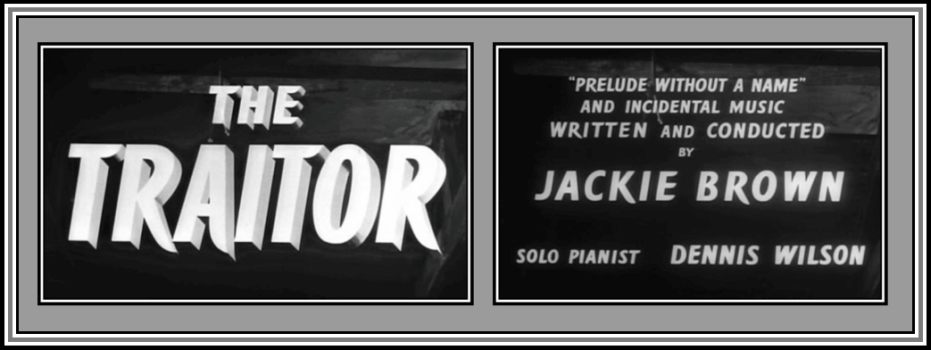
Music Played Over The Credits
The theme, entitled Prelude without a Name, was played in the film by Dennis Wilson (1920-1989).
-oOo-
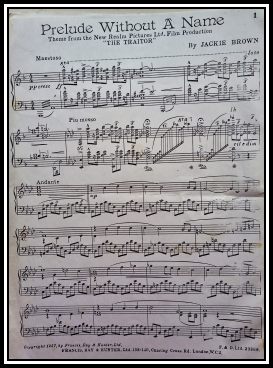 Copy of the First Page of the musical score of Prelude without a Name
Copy of the First Page of the musical score of Prelude without a Name
Jackie Brown playing Prelude without a Name
-oOo-

The film was directed by Michael McCarthy and had a running time of eighty-eight minutes. It starred Donald Wolfit (1902-1968), Robert Bray (1917-1983), Jane Griffiths (1929-1975) and Anton Diffring (1916-1989) and featured Christopher Lee (1922-2015). Donald Wolfit played a Second World War resistance leader who is attempting to seek out a traitor who betrayed his colleagues when survivors meet at a country house.
 Top Left: Donald Wolfit; Top Right: Robert Bray;
Top Left: Donald Wolfit; Top Right: Robert Bray;
Bottom Left: Jane Griffiths; and Bottom Right: Anton Diffring
-oOo-
The next E.J. Fancey Company film that Jackie was associated with was one of the first early British Rock ‘n’ Roll film, Rock You Sinners.
 Poster & DVD Sleeve
Poster & DVD Sleeve
The film was produced in 1957 with a running time of fifty-nine minutes and was directed by Denis Kavanagh (1906-1984). The film starred Philip Gilbert (1931-2004), Adrienne Scott, Colin Croft, Jackie Collins, Michael Duffield and Beckett Bould (1880-1970).
 From Left to Right: Philip Gilbert (1931-2004); Adrienne Scott (1933-2013);
From Left to Right: Philip Gilbert (1931-2004); Adrienne Scott (1933-2013);
Colin Croft (1922-1989); and Jackie Collins (1937-2015)
Jackie did not provide any of the Rock music heard in the film, but was responsible for the incidental music that accompanied it.

-oOo-
Like all early Rock ‘n’ Roll films, this film was basically a showcase for the entertainers and so had a thin plot, which involved the wish to produce a Rock ‘n’ Roll Show for Television. The film is set mainly in clubs, coffee bars and small recording studios in London. Again, as always in such films, there were difficulties between the hero and heroine, which was sorted out by the end of the film!
Art Baxter & His Rock ‘n’ Roll Sinners – Rock You Sinners
-oOo-
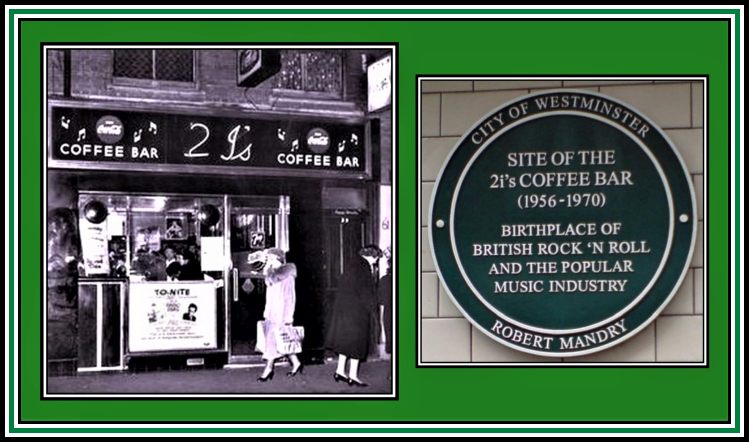 The 2i’s Coffee Bar was the most famous of such establishments and was situated
The 2i’s Coffee Bar was the most famous of such establishments and was situated
at 59 Old Compton Street in London’s District of Soho between 1956 and 1970.
It was here that many British artists were discovered.
 Wee Willie Harris (1933)
Wee Willie Harris (1933)
Wee Willie Harris – Rockin’ at The 2i’s
-oOo-
 Art Baxter
Art Baxter
The film featured Art Baxter with a group that he helped form, The Rock ‘n’ Roll Singers. In addition, it also featured Tony Crombie & His Rockets along with a number of unknown entertainers who never achieved great career success. The Disc Jockey, Tony Hall (1928-2019), appeared as the compere of the show produced for Television in the film. Mr. Hall would later find success as a Music Executive.
Tony Crombie (1925-1999) was a drummer and composer and had previously achieved fame in the Jazz genre and who, together with Ronnie Scott (1927-1996), first brought Bebop to the U.K. Following the making of this film, Mr. Crombie returned to playing Jazz and composing.
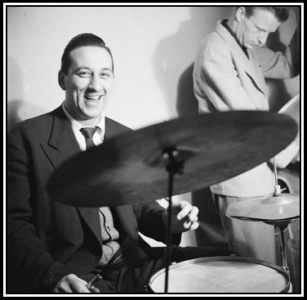 Tony Crombie
Tony Crombie
-oOo-
It is perhaps of interest to note that the title tune, Rock You Sinners, performed by Art Baxter & His Rock ‘n’ Roll Sinners, was banned by BBC Radio.
-oOo-
In 1958, Jackie provided the music to the film Action Stations, which was another E.J. Fancey Company production of an earlier Spanish film.
 Poster showing the Working Title, Hi-Jack, of the film
Poster showing the Working Title, Hi-Jack, of the film
It is interesting to note that Jackie’s music was not used when the film was released in Spain under the title of Pasaporte al infierno with music by Martin Montserrat Guillemat (1906-1990; aka Serramont). The song used in the film, Inspiration, was written by Eddie Ranada.

Music composed by Jackie and heard over the credits at the start of the film
Action Stations starred Paul Carpenter (1921-1964), María (Mary) Martin (1923), Joe Robinson (1927-2017) and Ronald Leigh-Hunt (1920-2005), and was directed by Cecil H. Williamson (1909-1999).
 From Left to Right: Paul Carpenter, Maria Martin, Joe Robinson & Ronald Leigh-Hunt
From Left to Right: Paul Carpenter, Maria Martin, Joe Robinson & Ronald Leigh-Hunt
The film was a crime-thriller with a running time of 50 minutes with a plot that revolved around a forger and his daughter who flee to Spain when pursued by a gang of counterfeiters and are helped to evade their clutches by a group of smugglers.
-oOo-
In 1959, Jackie played the organ in another E.J. Fancey Company production, Shamus. The film was a comedy set in Belfast and tells the story of a poor orphan who finds a Leprechaun and steals his gold. The Leprechaun is not pleased and gives the boy a tail and tells him that the only way to lose it is to find a donkey without one!

 Top Left: Shamus; Top Right: The Leprechaun;
Top Left: Shamus; Top Right: The Leprechaun;
Bottom Left: Shamus & The Leprechaun; Bottom Right: Shamus with his tail
The film has a running time of fifty-one minutes and was directed by Eric Marquis and was filmed in colour with John Francis Rooney (1945-2010), as the orphan and Tiny Littler, as the Leprechaun. The orchestra leader was Max Jaffa (1911-1991) and Alan Paul was the conductor. Jackie provided the Special Effects Music for the Donkey Derby.

-oOo-
In 1960, the E.J. Fancey Company production of Girls From The Latin Quarter was released with Jackie providing the music once again together with the composer Cy Paine (1936).
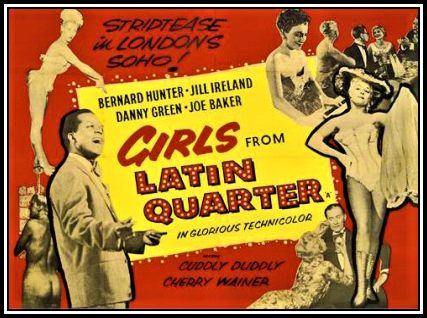
The film was a comedy-with-music set in the Soho district of London with a running time of sixty-nine minutes and directed by Alfred Travers (1906-?). The plot involves a young man who could inherit a fortune if he can turn the family farm into a thriving operation. To do this, he devises a plan to put on a show.
The film starred Bernard Hunter (1920-2012), Jill Ireland (1936-1990), Danny Green (1903-1973) and Joe Baker (1928-2001) and featured the music entertainers, Cuddly Dudley (1924-2011) and the organist, Cherry Wainer (1935-2014).
 From Left to Right: Bernard Hunter; Jill Ireland; Danny Green; & Joe Baker
From Left to Right: Bernard Hunter; Jill Ireland; Danny Green; & Joe Baker
 Left: Cherry Wainer; Right: Cuddly Dudley
Left: Cherry Wainer; Right: Cuddly Dudley
-oOo-
Both Cherry Wainer and Cuddy Dudley came to prominence through their appearances on the Television programme, Oh Boy! (1958-1959), which was produced by Jack Good for the Associated British Corporation (ABC), a franchise of ITV. Ms Wainer was a member of the programme’s House Band, Lord Rockingham’s XI and performed on the recording of Hoots Man, which reached number one on the Hit Parade when released in 1958.
Lord Rockingham’s XI – Hoots Man
-oOo-
 Michael Winner (1935-2013)
Michael Winner (1935-2013)
Between 1960 and 1961, Jackie together with Cy Payne provided the music for three films directed by Michael Winner: Climb Up The Wall (1960), Out of the Shadow (1961; aka Murder on The Campus) and Some Like it Cool (1961). Jackie also provided the music for a fourth film directed by Michael Winner entitled, Old Mac (1961), which was made for the Children’s Film Foundation. Each of these films was an E.J. Fancey Company production.
-oOo-

Climb Up The Wall (1960) was the second film directed by Michael Winner and was a musical-comedy film starring Jack Jackson (1906-1978), Glen Mason (1930-2014) and Russ Conway (1925-2000) and also featured uncredited appearances by Peter Sellers (1925-1980) and Harry Secombe (1921-2001). Other entertainers were featured in the film and included Craig Douglas (1941), Mike Preston (1938), Cherry Wainer (1935-2014) and Libby Morris (1930).
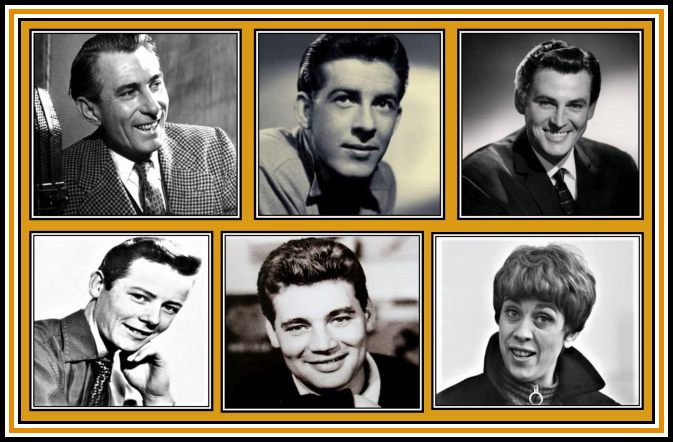 Top Row, from Left to Right: Jack Jackson; Glen Mason; Russ Conway;
Top Row, from Left to Right: Jack Jackson; Glen Mason; Russ Conway;
Bottom Row, from Left to Right: Craig Douglas; Mike Preston; Libby Morris
The film is basically a variety show with acts introduced by Jack Jackson who had been a band leader and disc jockey on both the BBC and Radio Luxembourg. Jackie and Cy Payne provided the incidental music heard in the film.
-oOo-
Michael Winner’s third film, and the second made with Jackie providing the music with Cy Payne, was Out of the Shadow (1961; aka Murder on The Campus). A full account of the plot is given at the website, Noirish, which is The Annex to John Grant’s A Comprehensive Encyclopedia of Film Noir.
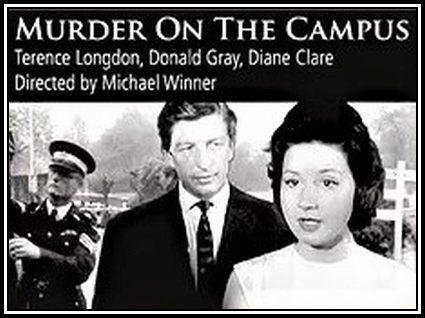
The film follows a man whose brother had supposedly committed suicide by jumping into the River Cam from his room at a Cambridge College. The film has a running time of sixty-one minutes and starred Terence Longdon (1922-2011), Donald Gray (1914-1978), Diane Clare (1938-2013), Robertson Hare (1891-1979) and Dermot Walsh (1924-2002).
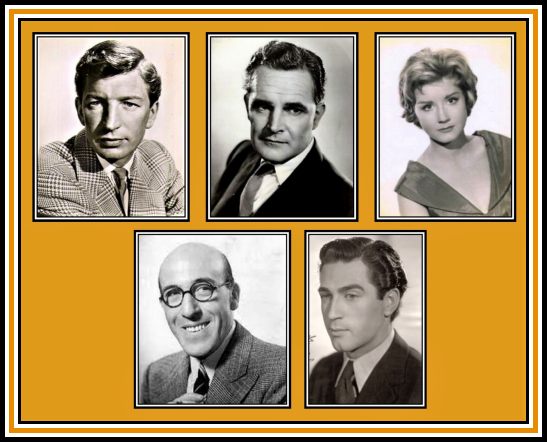 Top Row, from Left to Right: Terence Longdon; Donald Gray; and Diane Claire;
Top Row, from Left to Right: Terence Longdon; Donald Gray; and Diane Claire;
Bottom Row, from Left to Right: Robertson Hare; & Dermot Walsh
-oOo-
Donald Gray was well-known to BBC-Television viewers in the 1950s and 1960s as one of the presenters (continuity announcer) of evening programmes. Dermot Walsh was also well-known to ITV Television viewers for his playing of King Richard I (1157-1199 ;Coeur de Lion) in the series, Richard the Lionheart (1962-1963).
-oOo-
 Posters advertising the film, Some Like it Cool
Posters advertising the film, Some Like it Cool
The third film that Jackie and Cy Payne provided the music for a film directed for Michael Winner was Some Like it Cool. The film was released in 1961 and dealt with naturism and starred Julie Wilson (1924-1990) and Marc Rolland. Like most films dealing with this subject produced during the 1950s and 1960s, it centred on efforts to persuade someone to visit a nudist camp. Part of the film was made at the Marquis of Bath’s estate at Longleat. According to Mr. Winner, the film recouped its total costs within two weeks of release.
 Julie Wilson – aka Queen of Cabaret
Julie Wilson – aka Queen of Cabaret
-oOo-
The final film that Jackie provided the music for a Michael Winner film was Old Mac. This film was produced by Michael Winner and directed by Michael Bayley (which is most likely a pseudonym of Michael Winner) and was made for the Children’s Film Foundation. The film, was released in 1961 with a running time of fifty-three minutes and starred Charles Lamb (1900-1989), Vi Stevens (1891-1967) and Tania Mallet (1941-2019). Unfortunately, I have been unable to discover the plot of the film.
 From Left to Right: Charles Lamb; Vi Stevens; & Tania Mallet
From Left to Right: Charles Lamb; Vi Stevens; & Tania Mallet
—oooOooo—
Jackie, using the pseudonym of John Brunel, also provided the music for two more films dealing with naturism. The first, Travelling Light, was released in 1960 and the second, Sunswept, in 1961. Both films star Yannick Philouze (1936-2016) and Elizabeth Walker (1941-2011) and were directed and produced by Edward Craven Walker (using the pseudonym of Michael Keatering) who also was the cameraman for the underwater sequences.

The plot of Travelling Light centres around a young woman who while sunbathing is invited to join some naturists on a trip a nudist colony in Corsica. There she meet the French actress, Yannick, who performs a unique underwater ballet.

Unfortunately, I have not been able to find any information regarding the plot of Sunswept other than it is most likely made with a similar plot to Travelling Light.
—oooOooo—
ACKNOWLEDGEMENTS
I would like to thank Mr. Andrew Gilbert, Mr. Michael Wooldridge and Mr. Keith Beckingham for their help in the writing of this page.
Both Mr. Brown’s daughters, Amanda and Julie, and I would especially like to express our grateful thanks to Mr. Alexander Gleason for his help in the production of this page.

